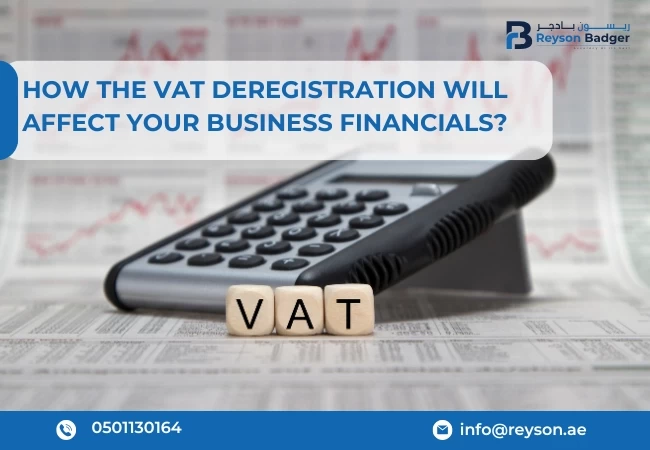

In the UAE, VAT deregistration is a major economic occurrence that can define the trading prospects of a business deeply. Growth contraction or changes in businesses may call for VAT deregistration but this should be done bearing in mind the implications of the results. Deregistration from VAT entitles certain consequences, including the inability to recover VAT on business expenditures and unsent invoices. Due to this effect, there is a need for businesses to understand the financial aspect well when it comes to VAT deregistration. Here we discuss the financial implications of VAT deregistration, including considerations and recommendations on how the UA Emirates businesses can manage the change effectively.
A business may apply for voluntary de-registration from VAT due to various reasons:
In certain situations, VAT deregistration becomes a necessity.
Step back, review the business operations, and assess the turnover. Compare any turnover that may be projected in the present with the VAT registration threshold. Check whether the business can sustain profitability without the benefits of VAT. If the turnover forecast remains below the threshold, then deregistration can be available.
Review all contracts in existence to identify deregistration implications on VAT obligations. Both the consideration of whether contract terms express prices inclusive and exclusive of VAT do reflect cash flow and post-deregistration pricing conditions. A proper draft of each contract avoids unintended VAT liabilities and shields each of the parties involved.
Exploring other available registration routes to settle VAT, such as being automatically registered if the business has significant input VAT that is recoverable and studying the pros and cons of remaining registered versus deregistration.
A business needs to notify the UAE tax authorities of its decision to deregister by fulfilling the needs stated in relation to time to the time stipulated in the local regulation.
An absolute VAT return should be filed covering all outstanding transactions up to the date of deregistration.
All outstanding VAT liabilities shall be paid within the timeframe of deregistration. Failure to do so may lead to such liabilities with penalties or legal action.
Once a business has deregistered, VAT records should be preserved for five years for purposes of audit or review by the tax authorities.
Review financial position, but not without considering turnover estimate and operational requirements. Consider whether it will impact cash flow and working capital since deregistration will strip away the potential of recovering VAT paid on statutory expense incurrences prone to cost overruns.
Cash flow and working capital will be further strengthened with the following measures:
Presently, these contracts must be checked from the angle of VAT implications if the status changes: potential repercussions on pricing, payment, and obligations. Customers and suppliers should always be consulted to avoid misunderstandings or miscommunications that may lead to monetary disputes or unbudgeted liabilities.
Tax consultants or even financial planners should be sought on matters regarding financial and contract implications of deregistration. Experts can help optimize cash flow while reducing possibilities of risk and complying with local tax regulations.
VAT deregistration is highly complicated and needs tight planning, so you must get expert advice for clear financial decisions. This is not any kind of fiscal transaction; there are liabilities in VAT for businesses, cash flow implications, and obligations in contracts before deregistration. Reyson Badger's VAT experts will guide you through the process with complete compliance and reduced financial risks. Do not let VAT deregistration take over the financial life of your company. Contact Reyson Badger to help you secure the financial future of your company. At Reyson Badger, you will make the right decisions about VAT, maximize the strategies for VAT, and gain business success in the UAE.